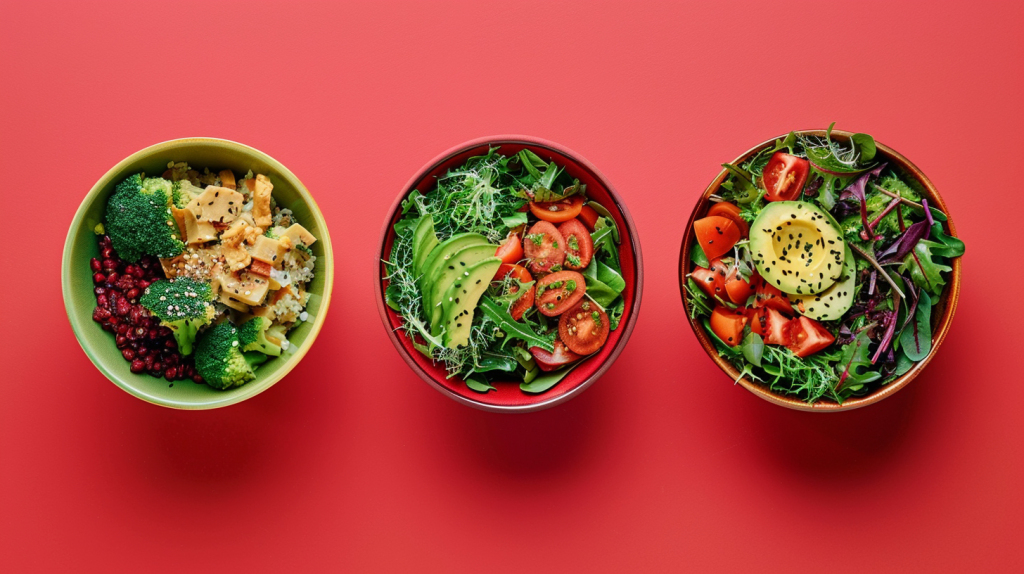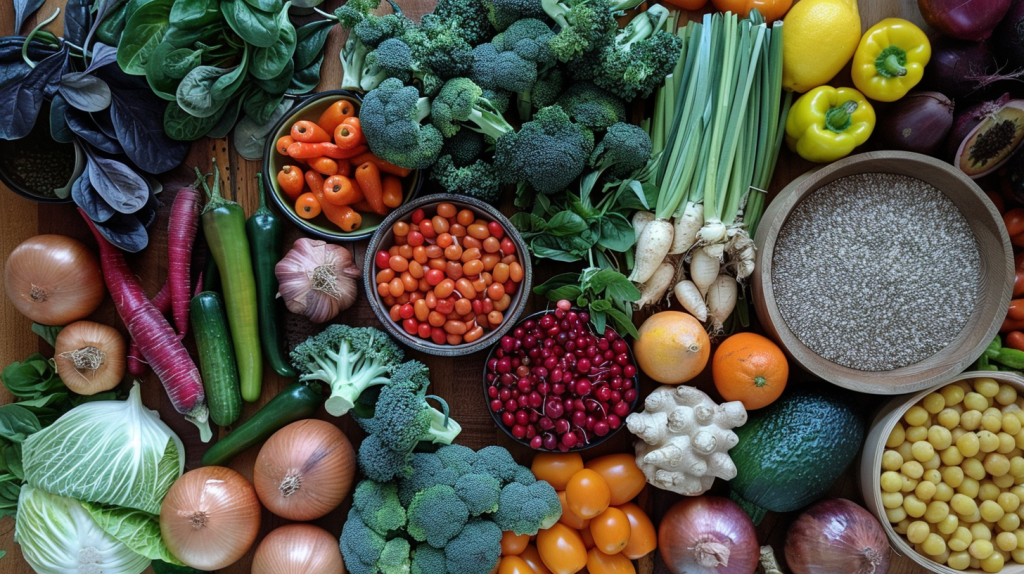Are you curious about the benefits of a plant-based diet? Or are you ready to start a new, sustainable, and ethical eating path? This guide will give you the knowledge and tools to begin. We’ll cover the basics of plant-based nutrition and the differences between vegetarian and vegan diets.

Choosing a plant-based diet can change your life. It brings health benefits and helps the environment. In this guide, we’ll look at different plant-based diets, their benefits, and tips to start. Whether you want to eat more plants or go fully plant-based, we’ve got you covered.
Starting this journey, you’ll see how plant-based diets can be varied, flexible, and tasty. We’ll look at vegetarian and vegan diets, helping you choose what’s right for you. This way, you can make a choice that suits your lifestyle and tastes.
This guide is for everyone, from health lovers to first-time dieters. It gives you the knowledge and motivation to enjoy a plant-based diet. It’s a path to a more sustainable, kind, and healthy way of eating.
What is a Plant-Based Diet?
A plant-based diet focuses on eating whole, minimally processed plant foods. This includes fruits, vegetables, whole grains, legumes, nuts, and seeds. It’s all about eating more plant foods and less animal products like meat, dairy, and eggs.

Understanding the Fundamentals
At the heart of a plant-based diet are a variety of plant foods. These foods are full of nutrients, fiber, and antioxidants. They give the body what it needs for good health and support many body functions.
Differences Between Vegetarian and Vegan Diets
It’s key to understand the differences between vegetarian and vegan diets. Both are plant-based:
- Vegetarian diets don’t include meat, poultry, or seafood. But, they can have dairy products and eggs.
- Vegan diets don’t have any animal products. This means no meat, poultry, seafood, dairy, or eggs. They stick to a strictly plant-based diet.
Both vegetarian and vegan diets offer many health benefits. They are full of whole grains, legumes, fruits, and vegetables. These are the main parts of a plant-based diet.
Health Benefits of Plant-Based Diets
Eating a plant-based diet can bring many health perks. It focuses on fruits, veggies, whole grains, and legumes. This kind of diet can lower the risk of heart disease, type 2 diabetes, and some cancers.
One big plus of a plant-based diet is its effect on heart health. It can make cholesterol and blood pressure better. This reduces the chance of getting coronary heart disease.
- These diets also help lower the risk of type 2 diabetes. They keep blood sugar and insulin levels in check.
- Also, they might cut down the risk of some cancers, like prostate and breast cancer.
Plant-based diets do more than prevent diseases. They boost overall health and happiness. They’re full of antioxidants, fiber, and important nutrients. This supports a strong immune system, good digestion, and sharp thinking.
For those looking to get healthier, a plant-based diet is a smart pick. By eating a mix of nutrient-rich plant foods, people can cut their risk of chronic illnesses. This way, they can enjoy the health perks of this eating style.
Plant-Based Diets and Disease Prevention
Choosing a plant-based diet can greatly improve your health. It helps prevent chronic diseases. These diets lower the risk of heart disease, diabetes, and some cancers.
Reducing the Risk of Chronic Diseases
Plant-based diets are full of fiber, antioxidants, and other good stuff. These help lower inflammation and improve how your body works. This can greatly reduce the risk of getting chronic health conditions like heart disease, coronary heart disease, and type 2 diabetes.
Impact on Heart Health and Diabetes
- Many studies show that plant-based diets can lower the risk of heart disease. They improve cholesterol levels, blood pressure, and heart health markers.
- These diets also help prevent type 2 diabetes. They keep blood sugar levels in check and make insulin work better.
- For people with diabetes, eating more plants is very good. It helps manage the condition and lowers the risk of diabetes-related complications.
Going for a plant-based diet can greatly improve your health over time. It cuts down the risk of many chronic diseases. It can also make living with heart disease or diabetes easier.
Plant-Based Diets for Weight Management
A plant-based diet can help people keep a healthy weight. These diets focus on whole, nutrient-rich plant foods. They work well with regular exercise to help with weight loss.
Plant-based diets are great for weight control because they are high in fiber and low in calories. They are also low in saturated fat and high in complex carbs, which can make you feel full and eat less. The fiber in these foods helps with digestion and supports healthy bowel function, aiding in weight management.
Plant-based diets are also good for weight loss because of their protein sources. Vegetarian diets are full of plant-based proteins like legumes, nuts, and seeds. These foods help keep muscle mass and support health while losing weight. They also help control hunger and reduce cravings, making it easier to follow a diet with fewer calories.
A plant-based diet with whole, unprocessed foods and regular exercise is a great way to manage weight. By eating nutrient-rich plant foods, people can improve their health and reach their weight loss goals.
| Benefits of Plant-Based Diets for Weight Loss | Potential Drawbacks |
|---|---|
| High in fiber, which can promote feelings of fullness and reduce calorie intake Rich in complex carbohydrates and low in saturated fat Provide a variety of plant-based protein sources to support muscle mass Can be an effective and sustainable approach when combined with exercise | Requires careful planning to ensure adequate nutrient intake, especially for vitamins and minerals May be more challenging for some individuals to transition to a completely plant-based diet Processed plant-based products may not always be the healthiest option for weight loss |
Sources of Plant-Based Protein
Following a plant-based diet means making sure you get enough plant-based protein. Whole grains and legumes are great choices. They are full of nutrients and give you a lot of protein.
Incorporating Whole Grains and Legumes
Whole grains like quinoa, brown rice, and oats are packed with plant-based protein. They also have lots of fiber, vitamins, and minerals. Legumes, including beans, lentils, and peas, are another great source of plant-based protein. They fit easily into many dishes.
To increase your plant-based protein intake, try these tips:
- Add quinoa to salads, soups, or as a side dish
- Put lentils in your chili, curries, or vegetarian burgers
- Snack on roasted chickpeas or edamame
- Use black beans or tofu in your tacos or burritos
- Try different plant-based protein sources to make your meals more interesting
By eating whole grains and legumes, you make sure your plant-based diet is full of plant-based protein and other important nutrients. This helps you stay balanced and healthy while enjoying the perks of a plant-based lifestyle.
Plant-Based Diets: Getting Started
Starting a plant-based diet might seem hard, but it can be easy and rewarding. If you’re thinking about starting a plant-based diet or want to follow a plant-based way of eating, here are some helpful tips. These will guide you on your journey to plant-based eating.
Meal Planning and Grocery Shopping Tips
Good meal planning is crucial for starting a plant-based diet. Start by adding more plant-based products to your meals. Slowly move to a diet full of whole, unprocessed foods. Plant-based nutrition is rich, and your plant-based diet can include many foods like:
- Whole grains
- Legumes
- Fruits
- Vegetables
- Nuts and seeds
When grocery shopping, buy lots of these healthy, plant-based products. Plan your meals ahead and make a shopping list. This keeps you organized and helps you avoid buying things that don’t fit your plant-based diet goals.
Plant-based diets are low in bad fats and high in good stuff like fiber, vitamins, and minerals. With some planning and creativity, you can easily make many tasty, plant-based meals for yourself every day.
Plant-Based Diet Myths and Misconceptions
The popularity of plant-based diets is growing, but many myths and misconceptions still stop people from trying this healthy lifestyle. It’s crucial to clear up these concerns with facts. This will help readers see the real benefits of plant-based eating.
One big myth is that plant-based diets lack essential nutrients. But, a well-planned plant-based diet can give you all the nutrients you need, like protein, vitamins, and minerals. Vegetarian diets may even be richer in fiber, antioxidants, and phytochemicals.
- Many plant-based foods, like legumes, nuts, and whole grains, are great for protein.
- Leafy greens, fortified plant-based milk, and supplements can help get enough vitamin B12 and calcium.
Some think plant-based diets are hard to follow and too limiting. But, with a bit of creativity and planning, plant-based eating can be fun and rewarding. There are so many tasty and satisfying plant-based recipes out there. This makes it easy to follow a plant-based diet.
To clear up these myths, we need to share accurate info and talk about the health perks of plant-based diets. By knowing the facts, more folks can feel ready to embrace a plant-based lifestyle. This can greatly improve their health and well-being.
Plant-Based Diets: Recipes and Resources
Going plant-based is great for your health and can be super tasty. We’ve put together a list of delicious plant-based recipes for you. You’ll find everything from hearty lentil stews to tasty vegetable stir-fries. These dishes show how versatile and rich plant-based food can be.
Want to try more plant-based dishes? Check out our recommended cookbooks. They have a wide variety of meals and snacks for different tastes and diets. Whether you’re new to plant-based eating or have been doing it for a while, these books will help you improve your plant-based meals.
We’ve also gathered some great blogs and educational materials on plant-based diets. You’ll find the latest research, tips on meal planning, and advice from experts. This will help you make better choices for your health and well-being.
